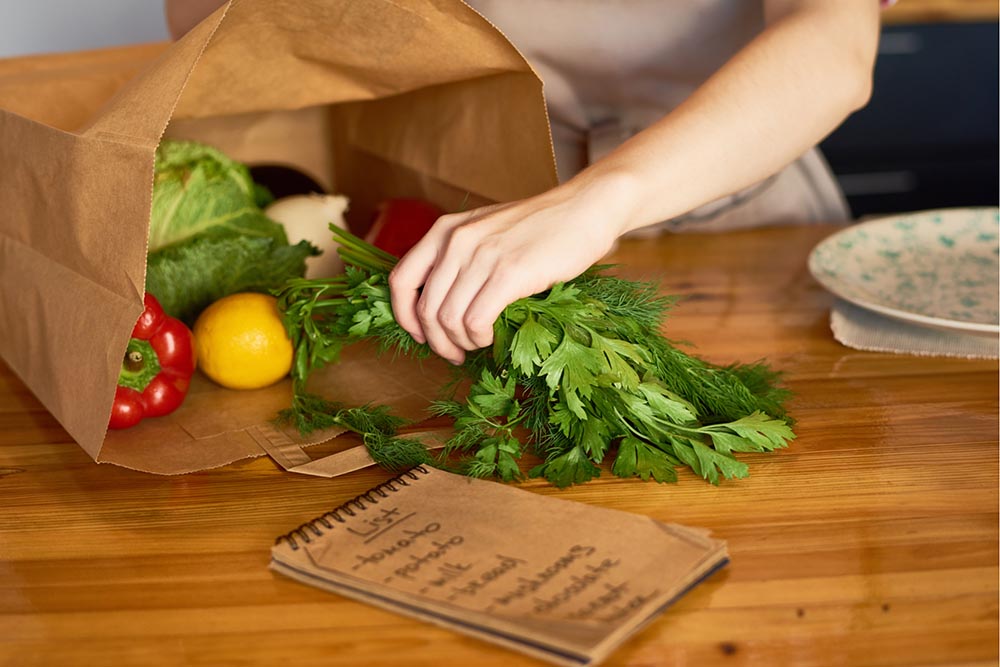Eating & Nutrition Tips During COVID-19: The Top 5 Things You Can Do

Living under the specter of COVID-19 causes a variety of feelings, including uncertainty, anxiety, fear, boredom, restlessness and even depression. Making healthy food choices isn’t always easy in the best of times. Making them under the weight of pandemic stress may feel impossible, especially when food may be the one of the few things you can control.
Emotional eating can start a cycle of poor eating habits that are hard to break. Healthy eating during a pandemic with social distancing or quarantine is possible and can help keep you healthy both emotionally and physically.
Obesity and COVID-19
Studies continue to highlight the link between poor food choices and obesity. For COVID-19 patients in their 50s and under, obesity has been shown to be the top risk factor for dying from the disease. Obesity increases the risk of breathing problems, or acute respiratory distress syndrome (ARDS). Because COVID-19 is an upper respiratory disease, obese patients with ARDS are more likely to have further complications because it is difficult for doctors to provide respiratory support.
A study conducted by the Centers for Disease Control (CDC) in March found that of the hospitalized patients:
- Sixty percent of patients ages 18-49 were obese.
- Nearly half (49 percent) of patients age 50-64 were obese.
- In patients over 65 years old, high blood pressure was the underlying risk factor, which was predominant in 70 percent of cases. Obesity was an underlying risk factor in 41 percent of cases.
This study indicates the most important things you can do to avoid complications should you contract COVID-19 are:
- Make mindful food choices
- Reduce anxiety and stress
- Boost your immunity
How to Make Mindful Food Choices
COVID-19 requires coping with many stressful emotions and feelings, and the kitchen is always just a few steps away. Do you find yourself emotionally eating more than usual? Are you baking more for comfort?
One of the most important things you can do for your physical and mental health is make mindful food and drink choices. Here are the top five nutrition tips for staying healthy at home during COVID-19:
- Make a list before heading to the grocery store.
Determine which meals you want to make during the week and decide what ingredients you need. Shopping without a list might cause you to impulse buy and make poor food choices. Do not shop while hungry, which also increases impulse buying. - Focus on whole foods.
Limit the amount of processed foods you purchase and instead aim for fresh fruits and vegetables, whole grains, healthy fats and lean proteins. Stick to the outer walls of the store where fresh foods, meats and dairy are located and skip the aisles as much as possible to avoid tempting snacks. - Use apps for new recipe and snack ideas.
Several nutrition apps can help you make mindful food choices. Apps can give you recipes, nutrition facts and keep you motivated and on track. - Keep temptations at bay.
If no chips or cookies are in the cabinet or ice cream in the freezer, you can’t eat them. Refrain from keeping tempting foods in your home. During times of stress, you will be tempted to reach for these comfort foods instead of healthier choices, such as an apple or carrot sticks and hummus. - Indulge mindfully.
Allow yourself to indulge in your favorite comfort food sometimes. Pick one day out of the week to eat your favorite food and mindfully enjoy it!
Nutrition to Reduce Anxiety and Stress and Boost Immunity
The food we eat gives us the energy our bodies need to function. Proper nutrition can also reduce anxiety and stress and boost immunity. The following nutrition tips will support you during this and other times of stress times and give you the added protection you need to stay safe and healthy:
- Eat foods rich in vitamin C, such as oranges, tangerines, grapefruit and red bell peppers, to help support your immune system.
- Eat plenty of antioxidant “super foods,” like blueberries, broccoli, sweet potatoes and spinach.
- Flavor your recipes with immune-boosting spices, like ginger, garlic, turmeric and capsaicin from chili peppers.
- Include zinc, which can be found in cashews, clams and egg yolks.
- Look for foods rich in magnesium to help boost your immunity. Magnesium-rich foods include legumes, nuts and seeds, greens and whole grains.
- Omega-3 fatty acids have been shown to reduce stress and anxiety as well as improve cholesterol. Look for fatty fish such as wild Alaskan salmon. Omega-3 fatty acids are also found in ground flax seeds.
- Eat foods rich in probiotics, such as sauerkraut, miso and pickles, to support gut health.
What if Fresh or Healthy Choices Aren’t an Option?
Whether due to limited finances, food supply shortages or being quarantined, healthy nutrition choices may be harder to make. You may be surprised at how well you can manage with what you have on hand.
- If you can get to the store, prepare in advance. Create your budget, then list the recipes you want to make during the week. See how many ingredients you already have on hand and make a list of only what’s needed. Also, make note of any ingredients that can be substituted or eliminated if they are not available.
- Do you have frozen leftovers in your freezer that you’ve been passing up for more palatable dinner fare? Clean out the freezer and have one dinner a week to use your leftovers.
- When you do shop, only shop for one to two weeks at a time to avoid food spoilage and contributing to unnecessary demand and shortages.
- Frozen fruits and vegetables are just as nutritious as their fresh counterparts, can stay in the freezer for a long time, and are often cheaper.
- Most canned vegetables, fruits and meats contain the same nutrients as fresh, but are cheaper and have a long shelf life.
- Clean out your pantry – what can you make with what you have on hand? Chili? Soup? Pasta? List what you have on hand and use the Internet to search for new recipes to make with your ingredients.
Food Safety
In addition to thinking about healthy food choices, you also need to consider food safety to avoid food-borne illnesses. To stay safe from disease-causing bacteria, consider these tips:
- Wash your hands with soap and water for at least 20 seconds before handling food.
- Rinse fresh fruits and vegetables under running water before eating. This includes food with skins and rinds that are not eaten, such as watermelon and cantaloupe.
- Before opening cans, always wash lids first.
- Always refrigerate or freeze meat, eggs, seafood and other perishable items within two hours of purchasing.
- Keep raw meat, poultry, fish and eggs separate from other foods in your cart, counter and refrigerator.
- Use a separate cutting board for meat, poultry and fish, and wash your cutting boards with hot soapy water after each use.
- Clean and sanitize kitchen counters with disinfectant, or home-made sanitizing solutions. You can make a solution with 1/3 cup unscented liquid chlorine bleach and 1 gallon of water (or 4 teaspoons of bleach per quart of water). (Never use this solution or other disinfectants on food.).
Striving to eat nutritiously can be challenging without navigating a pandemic. With the added stress, you may feel afraid, uncertain or simply burned out. If you need help managing your diet during the current health crisis post-bariatric surgery, request a telemedicine appointment at Advanced Laparoscopic Associates. Our Registered Dieticians can help keep you on track toward your weight loss goals.

